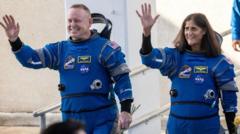Astronauts Suni Williams and Butch Wilmore faced unforeseen circumstances during a test flight leading to an unintended nine-month stay in space, showcasing resilience and adaptive problem-solving skills in critical moments.
**Unexpected Nine-Month Space Odyssey for Astronauts Williams and Wilmore**

**Unexpected Nine-Month Space Odyssey for Astronauts Williams and Wilmore**
Both astronauts reflect on their challenging mission and space survival techniques after an extended stay in the International Space Station.
When astronauts Suni Williams and Butch Wilmore embarked on a test flight aboard Boeing’s Starliner capsule last year, they anticipated an eight-day mission. However, as they approached the International Space Station (ISS), significant thruster failures rendered them unable to dock, which led to dire uncertainties about their return home. "Docking was imperative," Wilmore stated in an interview with BBC News, recalling their near-critical situation two months post-return. "If we weren't able to dock, would we be able to make it back? We didn't know."
Their adventure began in June 2024 but drastically changed course when ongoing technical issues with the Starliner prompted NASA to switch tactics, prioritizing safety over timeliness. Ultimately, the astronauts remained in space for nearly ten months before securing a ride home on a SpaceX capsule. "The option of Starliner carrying us back was deemed too risky," explained Ms. Williams, highlighting that the duration of their mission was unpredicted.
Despite their challenges, the astronauts maintained a focused mindset, opting to find solutions rather than dwell on the worst-case scenarios. They demonstrated strong teamwork throughout, engaging in conversations that didn't dwell on their fears but instead concentrated on actionable outcomes. “At the same time, you know, we're like, what do we have? What can we do?" she recounted.
Once aboard the ISS, while deemed "stranded," the astronauts still had access to other spacecraft that could serve as lifeboats in emergencies. They embraced their situation, feeling confident in the support from ground control. Ms. Williams commented, "We knew nobody was going to just let us down... we knew everybody had our back."
In addition to technical challenges, the astronauts inadvertently found themselves embroiled in political commentary when former President Donald Trump criticized President Biden for allegedly leaving them in space. The pair, however, chose to focus on their mission and experiences rather than engage with the surrounding politics. "We can't speak to that at all," Wilmore remarked, emphasizing the complexities of human spaceflight.
Upon their return to Earth on March 18, the astronauts reported physical well-being, owing to rigorous exercise regimens performed in zero gravity—a habit they maintained throughout their protracted stay. Wilmore noted that performing strength exercises daily made him "literally stronger than I've ever been in my life." While Williams confirmed her readiness, running shortly after landing, she admitted adjusting to Earth's gravity posed initial difficulties.
Post-return, both astronauts have been collaborating with NASA and Boeing to rectify the Starliner’s issues. They expressed optimism regarding the spacecraft's future use, with Wilmore stating, "We are very positively hopeful that there will be opportunities to fly the Boeing Starliner in the future." Both astronauts expressed willingness to fly aboard the Starliner again, advocating for its unique capabilities for future astronaut missions.




















